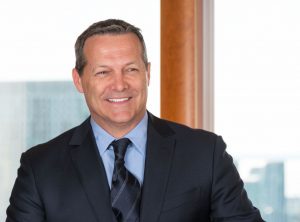
Sean St. John has spent the better part of 25 years building a career in banking and finance. With a set of core values in tow, the business executive accredits much of his success to the dedication of the people around him, predominantly his team at National Bank Financial.
Sean St. John currently serves as the Executive Vice President, Co-Head of Fixed Income, Currencies and Commodities. In 2016, he helped National Bank become the top adviser on Canadian debt issues for corporations and governments.
In addition to his professional work, St. John is a devoted philanthropist, dedicating his time and expertise to organizations such as Right To Play, the Princess Margaret Cancer Foundation, and Connected North.
We recently sat down with Sean St. John to discuss his career trajectory, his leadership style and what core values he believes are necessary for life in the business world.
Tell us about yourself and your business background.
Sean St. John: I started out with a degree from York University in Business Administration. My first positions were working as a Junior Bond Trader at Burns Fry and a Corporate Bond Trader at Richardson Greenshields. After that, I was hired by National Bank as the Vice President of Fixed Income. Now, as Executive Vice President and Co-Head of Fixed Income, Currencies & Commodities, I oversee sales and trading, infrastructure finance, debt capital markets, and interest rate derivatives, as well as FC and commodities.
Outside of work, I am a single dad, so I spend a lot of time with my son and my friends. I like to work out, play guitar, and relax at my cottage up north. My team and I at National Bank enjoy giving back to the community and being involved in charitable events. Not only is it a good time, it also builds a sense of pride within the organization.
For the better part of 20 years, you’ve remained competitive in a continuously changing financial industry. How have you kept up with a rapid pace of change and stayed ahead of the curve?
Sean St. John: Really, it’s a constant learning process. I’ve learned that keeping up isn’t enough. Business is competitive, and as a leader you always have to be ahead of the curve. Learning, growth and responding to change are key. Cultivate a passion for learning in yourself and your team.
What do you think makes a great leader?
Sean St. John: To become a successful leader, you have to know how to communicate effectively, show compassion, work as a team, and be able to problem-solve. These are all applicable to every field, and they are skills that make you a better person overall. In my opinion, having the right team of people is the number one factor when it comes to a company’s success.
What character traits can be learned, practiced and internalized to help someone become a better leader?
Sean St. John: Compassion and caring. These traits mean showing sincere interest and genuine concern for others. It also includes consideration, empathy and nurturing. Caring does not mean tolerating shoddy performance or bad attitudes, but it does mean realizing your team is the most important resource in any organization. Leaders who display these character traits will likely be rewarded with cooperative and supportive behavior in return.
What advice would you give to young executives in the banking and financial field?
Sean St. John: Pay attention to the intangibles. Soft skills are becoming more important to landing a job in finance today. On paper, many applicants appear the same, with the same degrees and same internships. A well-developed set of soft skills will help you to stand out and leave a good impression. Companies in finance and banking are looking for new hires who possess these “people” skills and want someone who has a sense of community and connection.